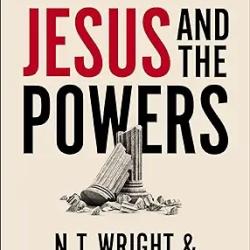panion to this one… if we are not both exhausted and if we are still game then.
Blessings to you and yours, and we at Asbury hope you will come back sometime,
Ben
—–
BEN: You decided to go out with a bang dealing with the most complicated material in all of Paul’s letters in Rom. 9-11 in your final chapter. This particular segment of Romans has been said to be the exegetes graveyard, where they go to die or at least die trying to figure it out. Let’s start with some of your observations on pp. 527-28, where, not surprisingly, you are going to argue that God’s incongruous grace and mercy are what helps one untie the Gordian knots in this passage and make sense of the whole. You say, rightly in my view, that Paul’s view of the election of Israel involves the group as a whole, and Paul is not arguing that God’s selection within the elect is enough to satisfy Paul when it comes to God’s promises to Israel. As you say, this hardly makes sense of Paul’s prayer in Rom. 10.1-2 for the salvation of his supposedly non-elect Jewish kin, nor does it make any sense of what Paul says about all Israel being saved at the end of Rom. 11.25ff. The language of call, elect, love is applied to the whole group in Rom. 11. You say “It seems better to read Rom. 9.6b and the following verses as intended not to justify God’s selection within Israel but to clarify the grounds on which Israel as a nation was created and selected” (p. 528). Help us to understand the logic of this conclusion better. Does the statement on p. 529 “the crucial issue in 9.6-18 is not whom God has chosen (and whom he has left out) nor simply that he has exercised his choice. The emphasis lies on HOW God has chosen Israel” clarify things, and if so how?
JOHN: Well, yes, this is probably the most challenging segment of Romans, and one which interpreters either avoid, or get very bogged down in. The standard current reading is that Paul’s argument is inconsistent: he starts off on one track and then somewhere in chapter 11 (at 11.1 or 11.11 or 11.25) he veers off in a totally different direction, one which undermines and contradicts all he had said before. It is normally explained that he reverts to his ethnic prejudices, or changes his mind along the way, or just pulls a rabbit out of a hat. The problem comes if we read 9.6ff. as saying: God is not committed to Israel as a whole, only to some of them (the remnant), and the remnant of Jews who believe in Christ is all that is necessary for God to be true to his word. The rest, who do not believe in Christ, are like Ishmael/Esau/Pharaoh. Thus when Paul says that the remnant is not God’s final word, in 11.11ff., this is said to be a change of mind, or else (like Wright) Paul does not mean ‘all Israel’ in his normal sense of Israel when he writes 11.25-26. I think if we go back to 9.6ff and read it afresh we find this: 1) Paul says that not all desended from Israel (Greek ex Israel) are Israel: i.e. he is drawing attention to the fact that who counts as ‘Israel’ has never been a matter of descent; 2) he shows this in 9.7ff by reference to the three patriarchal generations (Abraham-Isaac-Jacob) – i.e. this is about how Israel was formed, not in the first instance about its subsequent history or the present. 3) The point is that God has always created and defined Israel in his own way, from the very beginning. To be Israel is to be not physically descended, but chosen. 4) This means that God has the perfect right, in line with the very character of Israel, to choose from within the people of Israel (which has sometimes been reduced to a remnant), but also has the perfect right to redeem all Israel (despite their disobedience). He has mercy on whom he has mercy: that is what it means to be Israel. So, instead of looking for who in Paul’s present is represented by what biblical figures in 9.6ff, we should be attending to Paul’s depiction of how God elects, chooses and orders Israel’s story, because it is that how which explains how Gentiles can now be grafted into the tree, and how all Israel can be redeemed in the future, despite present unbelief/disobedience. God can reduce to a remnant, he can graft in, and he can regraft – all in consistent accord with his way of acting from the start, which is by a mercy or grace that pays no regard to the worth of the recipients.
BEN: Paul makes an interesting contrast between the children of the flesh and the children of promise, in the former case ruling out the idea that Israel is constituted on the basis of lineal descent, and later he rules out status, works etc. as the basis of God’s choice. What exactly does ‘children of promise’ mean, and if God’s choice is purely on the basis of his incongruous grace, then at the end of the day there would seem to be no rationale, no way that we can figure out why he chose this group of people. Does incongruous grace leading to election make the whole thing inscrutable and imponderable, and therefore we should stop trying to logically figure this out?
JOHN: Children of promise is a phrase used both in Romans (9.8) and in Galatians (4.28) and reflects the fact that Paul is fascinated by the way that God not only promises certain things, but brings them about because he has promised them. In other words, the promises of God create the reality they promise. So the important thing about Isaac (and not only him) is that he was a human impossibility (Ishmael was a human possibility, a child according to the flesh) and thus can only be created by God’s own promise. And if God is the agent here, and if, as you say, God works without regard to human possibilities, expectations or worth, then indeed we cannot predict or limit what God can do. I think that is why Romans 9-11 finishes with its crucial final step: not ‘all Israel will be saved’ but ‘oh, the depth of the riches and wisdom and knowledge of God …’ (11.33-36). At the end, Paul’s theology is apophatic (it tails off into silence): he knows enough to know what he does not know. And God’s grace/mercy always leads us there, as the mysterious ‘I will have mercy on whom I have mercy’ should have told us already (9.15). One cannot figure out the ‘why’ of God’s mercy: one can only throw oneself upon it.
BEN: On pp. 534-35 you explain that “the purpose of God is shaped by its telos” and you add “it is the Gentile mission that gives clarity and impetus to Paul’s theology of incongruous grace. If Paul’s theology legitimizes his mission, it is also the case that his mission sharpens defines his theology, and here confirms that God’s call is both creative and unconditioned…it is precisely the ‘wealth’ of mercy that Paul experiences in the Gentile mission that gives him reason to look beyond the present distinction between the remnant and the rest (11.1-10), and to imagine a future in which even the excluded can be integrated again.” Can you tease this out for us a bit more. What one might take this to mean is that because it is the property of God to always have mercy, that in fact God can ignore any sort of pre-determined plan based on foresight or knowing something in advance when it comes to salvation and simply dole out his incongruous grace, or perhaps better said— the only plan God really had all along was to have mercy on sinful humankind both Jew and Gentile, and he chose Israel to spread the news about this and a particular Jew, Jesus, to be the Messiah and implement the plan.
JOHN: Yes, I think the ‘double predestination’ passages of Romans 9 have led us (since Augustine and Calvin) to think that there is a pre-determined plan of doubleness, that some are destined to be in, and others out. But the incompleteness of chapter 9 (as I read 9.22-24) and the fact that the discourse moves on to 11.36 indicates that we should not get stuck in chapter 9: the doubleness, or hardening and calling, is a step along the way to God’s will to have mercy (as 11.11 indicates). Paul’s theology is anchored not in a determined creational past, but in an eschatological future: if the past is important it is only for what it foreshadows and points forward to in the future. As Paul reads it, the purposes of God run towards mercy (11.32), though what that looks like in practice he is unable to say (hence 11.33-36!). Thus the plan is, as you say, oriented to the worldwide spread of grace. If that is not finally and fully effective, it will be not because God did not want it to be so, but because his grace will have been rejected by some in unbelief.
BEN: p. 537 is intriguing. You foreground the race metaphor as key to understanding what is happening at the beginning of Romans 10– Israel has stumbled in the race to the ‘telos’ i.e. goal, that goal being the Messiah, Jesus, and ironically those who were not even trying to enter the race, who were not disciplining themselves to pursue the right end, have reached the goal i.e. Jesus. Is that what you are saying? This would then make the translation ‘Christ is the goal of the Law’ preferable but what goal would mean is something like we call the finish line, or what in a Greco-Roman race amounts to a pole or marker at the finish line. Of course even if this is the metaphor in play, if Christ is the goal line of the Law, then he is also its finish, its end. That’s rather different than saying Christ is the fulfillment of the Law. Say more about what you mean.
JOHN: I think there are elements of a race metaphor in 9.30ff, or if not a race at least a sense of pursuing something and trying to reach it. If that carries on into 10.1-4 (the paragraphs seem closely linked) then a translation like ‘the goal of the law is Christ’ works well: this is what Israel was trying to reach in ‘pursuing the law of righteousness’ (9.31), and what has been reached by those who have faith. Paul has another word for fulfilment (pleroma) and he can use the cognate verb in relation to the law in 8.4 and 13.8 in a different context. In this context, what we are talking about is not fulfilling the commands of the law but the attainment of the its goal and intent. As you say, the goal can also mean its job is done, and its role is finished (as 7.6 suggests). I do not see Paul advocating a ‘third use of the law’ in the sense that the Torah remains in place, but now as an authority for believers. What matters now is walking in line with the Spirit – which will end up also doing what the law fundamentally required morally, but without being under its final authority (cf. 14.17 on food and drink, regulations in the Torah).
BEN: In some respects, the further I go in this last major chapter, the more you begin to sound like Ed Sanders, namely what’s wrong with the Jewish approach to righteousness is that it’s not the Christian one— namely that one is reckoned righteous by faith in Christ. Put another way, Paul’s experience of the Gentile mission with many coming to Christ through preaching the Good News convinced him that Jews were pursuing righteousness and right-standing with God the wrong way. Now this is interesting because it suggests that it was not just Paul’s conversion that convinced him about incongruous grace and mercy, offered as good news to all, but that his further experiences in mission solidified or clarified this. Does this make sense?
JOHN: Well, I think Paul is not accusing Jews of having the wrong kind of religion (works-righteousness) but of looking for the grace and righteousness of God within the frame of Torah-defined righteousness, while the ultimate gift of God in Christ, being incongruous, has broken out of that cultural frame. The problem identified in 10.3 is not zeal or works-righteousness, but ignorance: not ignorance of the Torah, of course, but ignorance (non-recognition) of what God has done in Christ. Unlike Sanders, I don’t think this is a bare a posteriori along the lines of ‘because it is by X, it is not by Y’. Rather, the whole being of Israel depends on the grace/mercy of God, and because God’s grace is finally and definitively effected in the gift of Christ, what it means for Israel to believe in Christ is not to cease to be itself and to change to being something else, but to be more like itself, to be Israel is its fullest state. So, to alter Sanders’ famous phrase: ‘this is what is wrong with unbelieving Judaism: it is not most truly itself in believing in Christ’.
BEN: In recalibrating what the focus and thrust of Rom. 9-11 really is you suggest that “works represent not human initiative but the display of human worth as defined by criteria other than God’s. Thus the central question is not ‘do we trust God or in our own efforts?’ but ‘is God’s saving action given to those we define as worthy, or without regard to worth?’ …the object of critique is… Israel’s assumption that Torah observers are the fitting recipients of the beneficence of God” (p. 541 n. 46). Is then salvation given not only without regard to worth but also without regard to the collective election of Israel? I agree with you that Paul’s point in reviewing Israel’s history is to make the point that people were not chosen on the basis of performance or worth. One could argue it is also about God being faithful to his promises regardless of the performance of Israel. Help us understand these interwoven ideas better.
JOHN: Paul demonstrates in Romans 9 that Israel is elected and selected without regard to her intrinsic worth; it is only by God’s decision of mercy. Paul does not think Israel has no zeal for God (on the contrary, 10.2), but that its zeal is predicated on the assumption that God’s goodness is channelled to fitting recipients, defined as those who practise the Torah (‘as from works’, 9.33). But because the Christ-event has no regard to any form of worth, it has application to all without exception, including Gentiles. This is, Paul insists, not a new kind of grace, but the very grace that has been the root of Israel from the beginning. So God is not now disregarding the election of Israel, but precisely fulfilling it by the very means by which is has operated from the start: without regard to works or any other kind of worth (including works of the Torah). Thus, as I put it, Israel is and remains special, but now no longer unique (‘to the Jew – first – and also to the Greek’). And God’s mercy, being unconditioned, can embrace Israel, despite unbelief and disobedience.
BEN: It appears on your showing that there are in fact three events which have caused the Copernican revolution in Paul’s thinking: 1) the Christ event itself; 2) the Damascus Road experience by Paul; 3) the Gentile mission, plus Paul’s Christological re-reading of the OT in light of these three events. Each of these or all of these has led to a rethinking of almost everything, including his concept of God and mercy and God’s people, on the part of Paul. Yes?
JOHN: Yes, I think that is right. There is a dialectical relationship (working in both directions) between the turth of the Christ-event and Paul’s experience (of his own calling/conversion and of the calling/conversion of Gentile believers): each cements and clarifies the meaning of the other. On that basis he goes back to the Scriptures and finds as a red thread running throughout the theme of the unconditioned mercy of God – which is what he traces in Romans 9-11. So what he has discovered is not a new God, but the God who worked in incongruous mercy in calling Israel, and who has now fulfilled that calling and purpose in Christ.
BEN: Your take on Paul’s metaphor of the root, and the branches is intriguing. You argue that the root is not Israel or Jesus or the patriarchs (thought I sense you think that is more likely than some other readings) but rather the root of fatness is in fact the calling/election/incongruous grace of God itself! I must say I didn’t see this reading coming. Will it not be objected that since the branches are people, then it is natural to see the root as people or a person as well? I grant that Paul mixes his metaphors, but is the root really an abstract concept? You even suggest that the Gentile branches are grafted into the ‘root’ not into the tree called Israel. So….. both Israel and Gentiles are grafted into an entity created purely by the grace of God, not into an pre-existing elect people? (p. 551 n. 75).
JOHN: The question is, what has nourishment (‘fatness’) enough to sustain and support the tree of God’s people (11.17-18)? Since the branches that are cut off (and can be grafted back in) are Israelites, it is hard to see how Israel can be both the root and the branches. 11.28 indicates that Israel are beloved because of the patriarchs, so that takes us back to Romans 4.1-8 and Romans 9.6-9 to ask: what is it about them that makes them so significant. Well, actually – and this is Paul’s whole point – there is nothing significant about them as such; they are significant only because they were created and elected by God in his mercy/grace. 11.16b suggests a clear distinction between the root and the branches, and I don’t think all parts of this metaphor have to refer to people (in the Galatians 4.31 – 5.1 allegory, the children of the promise are people but their mother is the Jerusalem above, God’s eschatological plan). So Israel has been from the start (9.6ff.) dependent on this root, which is why it is ‘natural’ for Israelites: but it is an elect people only in the sense that it lives out of election. Now Gentiles have been objects of mercy and so are grafted into the richness of the same root. They are not grafted into Israel (I don’t think Paul ever calls Gentile believers ‘Israel’), but grafted into mercy.
BEN: As you will know, in early Judaism Zechariah and other texts were taken to mean that in the end all Israel will be saved (see e.g. the Mishnah statement to this effect) by the bringing in of the Diaspora Jews streaming back to Zion, and on their coattails Gentiles going in with them. Paul simply reverses the polarity of this, says he got this from a special revelation a ‘musterion’ saying now that the full number of the Gentiles will come in first, and then afterwards when the ‘Redeemer comes forth from Zion and turns away the impiety of Jacob, then all Israel will be saved. In short, Paul is talking about an eschatological miracle at the parousia and resurrection, which once again is proof positive of incongruous grace. Why do you think there has been so much resistance to this reading of the end of the argument in Rom. 9-11, especially by Wright and some of the New Perspective folks? I would suppose in Wright’s case it’s because it spoils his narrative that Israel=church, or that Jesus=Israel=Jew and Gentile united in Christ.
JOHN: I do not think Paul is fully clear on when all Israel will be saved, or even precisely what ‘all’ means (there is the same ambiguity in other Jewish texts of this period), but I do argue, in agreement with you here, that Israel in 11.26 means (as in 11.25!) the people we have been talking about since 9.1 (‘my brothers according to the flesh’; ‘they are Israelites and to them belong …’, 9.4). Tom Wright is nowadays virtually alone among scholars in reading it otherwise (I was at a conference on Romans 9-11 with him in Germany a few years back, and everyone disagreed with his reading of 11.26); and I don’t find his long defence of his reading in The Faithfulness of God persuasive. Because he puts things in a linear history, from Adam to Abraham, through exile, to Christ, and because in his view Christ, as Messiah, represents and sums up all Israel, there cannot be a continuing place for Israel post-Christ. But if you read the whole of Scripture, as Paul does, as a working-out of God’s grace, first in Abraham and his offspring and now definitively in Christ, there is every reason to think that the promises of God, which cannot be recalled (11.28), can and will be fulfilled in the back-flow of Christ’s grace to Israel as a whole.
BEN: On p. 559 you say “If Paul cannot make sense of the Christ event without reference to Israel’s creation and sustenance by God’s elective call, neither can he make sense of Israel without reference to Christ.” I agree but could you unpack this a bit. I would say that Paul is even prepared to insert the pre-existent Christ into the picture of the earlier history of Israel as the sustainer of Israel (in 1 Cor. 10— the rock was Christ).
JOHN: Romans 9-11 shows (as Galatians already suggests) that the Christ-gift is not an out-of-the-blue event, but is the definitive clue to the total story of God’s people, from Abraham onwards. Israel is not just an illustration of a Christian theological point, but the narrative frame for everything that can said about the Christ event. But the same is true in reverse: Paul cannot now make sense of everything he reads in Scripture about Israel without reference to Christ who is the definitive, the final, and the complete enactment of the grace that has borne Israel from the start. But then the possibility arises of reading all that is said about Israel as referring in some sense to the Christ-event – and as you say 1 Cor 10 is a fascinating sign of Paul beginning to do that. And if Christ is then the frame in which to read everything about Israel, and about Adam and creation, we have just a short journey to make to Colossians 1.15ff, (already hinted at in 1 Cor 8.6) which frames all creation and all time within the story of Christ.
BEN John your last chapter is especially a tour de force argument, and it has set in motion all kinds of thoughts on election, so the following is just musing on possibilities but I wonder, in conclusion, what you would say to this—- If the election of Israel doesn’t impose on God an obligation to save a particular people (whether or not they measure up to God’s standards by the Law) or at least particular individual Israelites, then election must be about something other than salvation, for salvation even in the case of Jews is incongruous grace and God’s pure mercy. God owes sinners nothing, whether Jewish or Gentile sinners. God owes covenant breakers nothing. Election then, it seems to me, must be primarily about mission, about being chosen to be a light to the nations, not about individual salvation of Jacob instead of Esau etc. I agree election and salvation seem intertwined at points, but this seems to be because Paul has a corporate notion of election (it’s in Israel, and then it’s in Christ) which does not guarantee the salvation of some particular Israelite or Christian. What do you think?
JOHN: Thanks, Ben. I think you are right in this sense: election is not about being something special, or having something special. It is about being a sign of something beyond yourself, a signpost to a event and a person who is something, although (or because) you are nothing. And thus election can have no pre-determined limits: it is about mission in the sense that it always points to a reality of an incongruous grace that by definition has nobody outside its remit, and is thus always wanting to sweep up into its grasp the other equally unworthy people beyond yourself and outside your community. To confine God’s grace to ‘us and such as us’ is to contradict and to deny it. Election constitutes an open-bordered people who embody God’s grace in patterns of communal life that demonstrate and pass on that grace. It is communal because all life and all relationships are socially formed (I become who I am in social relations) and the notion of an isolated self-generated individual is a modern Western fiction. God’s grace reaches me through others and moves out from me to others: it is in communities of gift and receipt that we become all that we are meant to be. But more on that in the next book …!
















